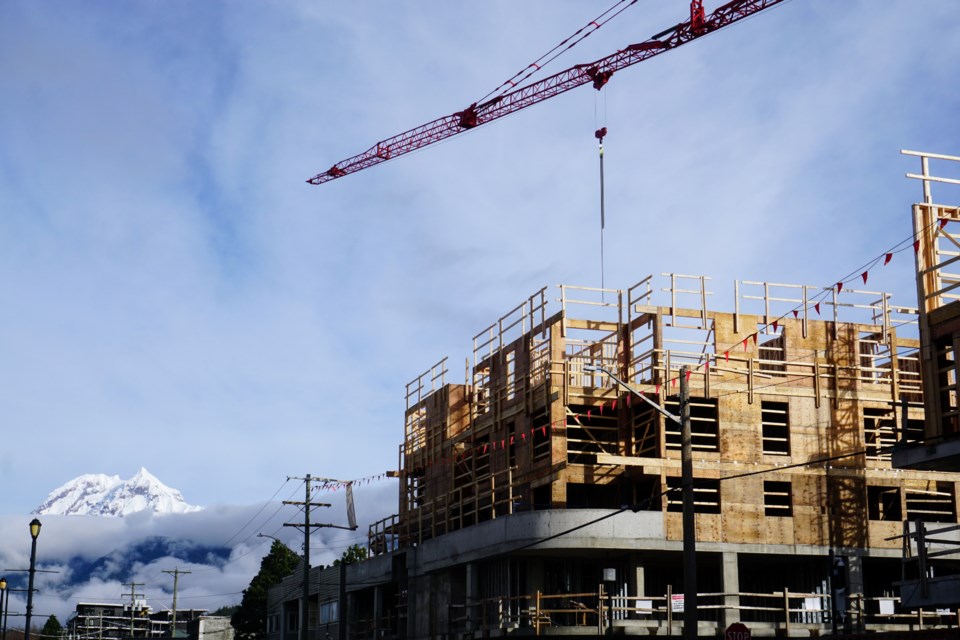The number of homes that sold in Squamish in 2022 significantly decreased compared with 2021, yet overall prices climbed, which largely impacts young buyers and first-time home buyers.
According to data sent to The Squamish Chief from the British Columbia Real Estate Association (BCREA), the number of homes sold in 2022 was 492 compared with 793 sold in 2021.
Sales in 2022 were the lowest overall since 2018, when 477 homes were sold.
“A lot of the story in 2022 was that the market that we started with in January last year was a lot different than the market that we ended with in December,” said Brendon Ogmundson, chief economist with the BCREA.
Ogmundson explained that 2022 started with above-average levels of sales. But, partly because of the Bank of Canada interest rate hikes that occurred throughout 2022, the end of the year saw sales at approximately 25 to 30% below average.
“Interest rates started going up really fast and that caused the market to slow pretty substantially,” he said.
Price jump
Despite the drop in sales, prices in 2022 climbed. The prices for detached homes increased by about 10%, whereas townhouses and apartments increased by 12% and 14%, respectively.
As a whole, the province saw an increase in prices of about 7.5%.
Ogmundson did say that annual data can be somewhat misleading.
“Prices peaked on a monthly basis in about February or March,” said Ogmundson, of Squamish. “It probably came down about 10% from peak, so prices are still lower than where they peaked in 2022.”
This jump in prices, however, was not as substantial as we saw in 2021. Prices jumped about 20% for detached homes and townhomes and 19% for apartments.
Still, prices and interest rate hikes remain challenging to real estate newcomers and low-income households.
“For younger buyers and first-time home buyers,” said Ogmundson. “It's really difficult right now because prices haven't come down that much after rising pretty substantially in the last two years and rates have gone up a lot.”
“Just the qualification on the mortgage side is just really, really difficult right now.”
A recent Royal Bank of Canada (RBC) report estimated that to afford a home in Vancouver, a household would need a minimum pre-tax income of $268,000.
“The price correction to date has done little to ease this affordability crisis,” reads the RBC report. “It will take further declines to reignite the ownership dream of many who have been shut out of the market.”
While the report did not estimate the minimum household income for Squamish, the same report estimated about $216,000 household income for buyers in Victoria.
Buyer's market
However, if you qualify for a mortgage, Lisa Bjornson says it’s currently a buyer’s market.
“If you qualify now with the current stress test and the interest rates, you're probably going to achieve a better price point,” said Bjornson, the managing broker at Royal LePage Black Tusk Realty. “As interest rates start to adjust and potentially come down as the economists are suggesting in the back half of the year, you can refinance and chances are prices will go up.”
For sellers, that means your home isn’t just going to get snatched up as it may have in 2021.
“We're back to relatively typical market cycles, where depending on what it is you're selling, 30 to 90 days is not uncommon,” said Bjornson about how long houses may be on the market. “Be prepared to be open. Buyers believe that they have the hammer, so they may come back wanting to negotiate a little more.”
Something that was still of concern for Bjornson is the inventory of homes in B.C. and Canada overall.
“We’re under housed,” she said. “Period.”
A report by the Canada Mortgage and Housing Corp. (CMHC) approximated about 3.5 million homes need to be built by 2030 to restore affordability. But, RE/MAX Canada says the country only builds approximately 200,000 to 300,000 units per year, which, at average, projects to be about half the supply needed of CMHC’s estimate.
“The inventory is going to continue to be the issue,” said Bjornson. “So, if you see it, you should buy it — if you can afford it.”
And, believe it or not, Bjornson hopes the market remains stable like it was more-or-less in the back half of 2022.
“Realtors don't like that crazy out-of-control market,” she said, adding that she saw some buyers needing to put in three or four offers.
“That’s emotionally hard on everybody,” she continued. “So, some balance or some moderation is a healthy thing.”





